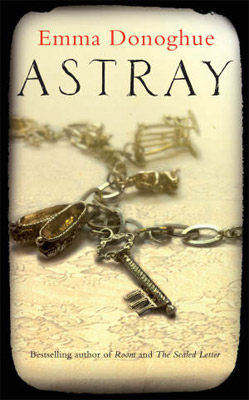Astray

Astray
From the prize-winning author of Room and The Sealed Letter comes a fascinating collection of short stories, Astray.
Counterfeiter. Dishwasher. Prostitute. Attorney. Sculptor. Mercenary. Elephant. Corpse.
The fascinating characters that roam across the pages of Emma Donoghue's latest fact-inspired fictions have all gone astray: they are emigrants, runaways, drifters. They cross other borders, too: those of race, law, sex and sanity. They travel for love or money, incognito or under duress.
Donoghue describes the brutal plot hatched by a slave in conjunction with his master's wife to set them both free; she draws out the difficulties of gold mining in the Yukon, even in the supposedly plentiful early days, and she takes us to an early Puritan community in Massachusetts unsettled by an invented sex scandal. Astray also includes 'The Hunt', a shocking confession of one soldier's violent betrayal during the American Revolution, which has been shortlisted for the 2012 Sunday Times Short Story Award.
These strange, true tales light up four centuries of wanderings, offering a past made up of deviations, and a surprising and moving history for restless times.
Born in Dublin in 1969, Emma Donoghue is an Irish emigrant twice over: she spent eight years in Cambridge doing a PhD in eighteenth-century literature before moving to London, Ontario, where she lives with her partner and their two children. She also migrates between genres, writing literary history, biography, stage and radio plays as well as fairy tales and short stories. She is best known for her novels, which range from the historical (Slammerkin, Life Mask, Landing, The Sealed Letter) to the contemporary (Stir-Fry, Hood, Landing). Her international bestseller Room was a New York Times Best Book of 2010 and was a finalist for the Man Booker, Commonwealth and Orange Prizes.
Astray
MacMillan Publishers
Author: Emma Donoghue
ISBN: 9781447211952
Price: $29.99
Interview with Emma Donoghue
Question: What was your main motivation behind Astray?
Emma Donoghue: As always, telling stories. I hate the idea that historical education is primarily educational; I really wouldn't bother scrabbling through the detritus of history unless I thought the results would be at least as interesting and narratively gripping as a purely invented, modern story. But with 'true fictions' like these there's also one more motivation: I feel as if I'm resurrecting ghosts who never wanted to be forgotten.
Question: What do you enjoy most about writing short stories?
Emma Donoghue: Because they're shorter, they can exist complete in your head, so you can examine them from every angle, like a faceted jewel. Novels are so baggy, they're hard to keep a grip on. Put another way, a novel is a marriage but a short story is a perfect affair.
Question: What research went into the stories of Astray?
Emma Donoghue: The equivalent of fourteen novels. Seriously, this is not a time-efficient way to work! To get the details right for the six-page story 'Last Supper at Brown's', for instance, I had to immerse myself not only in Texas life during the American civil war, but the speech patterns of slave dialect: a story being short is not excuse for getting it wrong.
Question: What are you currently writing on?
Emma Donoghue: A murder story about a still unsolved unshooting in San Francisco in 1876: the victim was a cross-dressing frog-catcher.
Interview by Brooke Hunter
MORE



